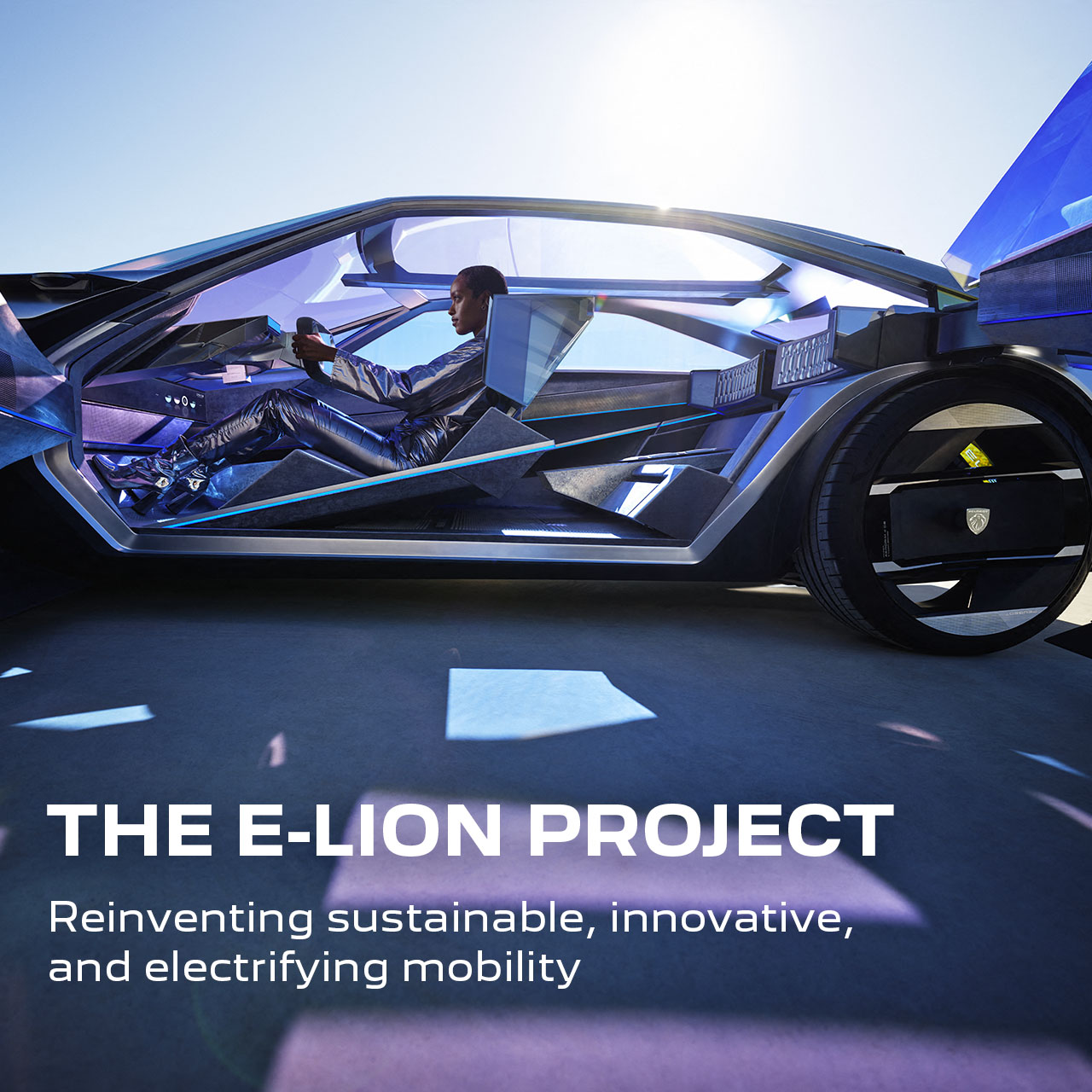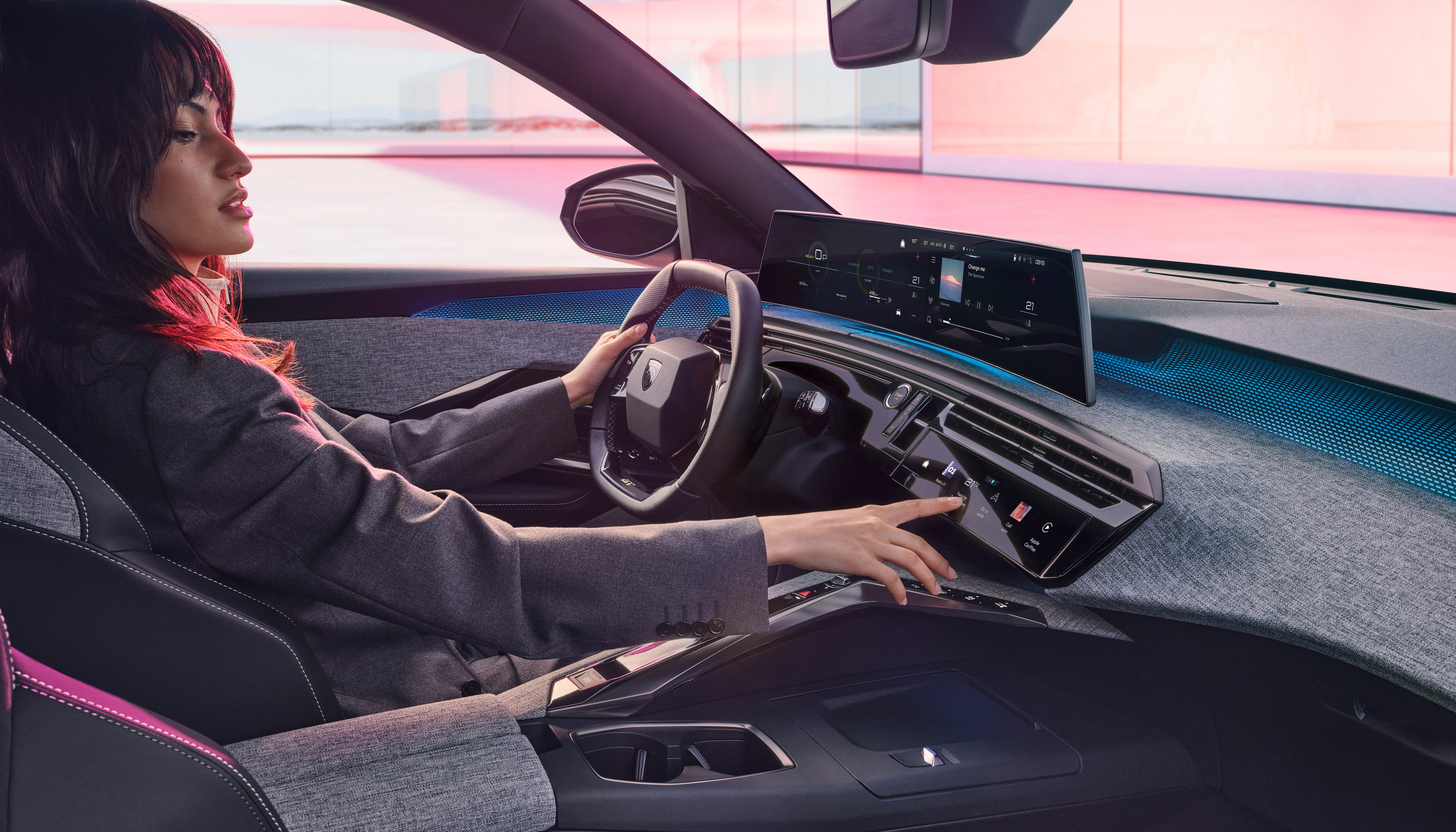
PEUGEOT E-LION
LEADING THE WAY TOWARDS THE ELECTRIC ERA
Peugeot, the automotive brand with a feline design, embraces a bold vision where technology serves sustainable mobility and driving pleasure,
with the ambition of achieving carbon neutrality.
The E-Lion project outlines the roadmap towards this optimistic and sustainable future with a 360° approach, built around five pillars:
Electric, Efficiency, Experience, Education, and Environment.
Peugeot aims to offer its customers electrified, sustainable and efficient mobility solutions, an optimal experience,
while contributing to the education of future generations and continuously improving its processes and products.
CEO of PEUGEOT
PEUGEOT E-LION
LEADING THE WAY TOWARDS THE ELECTRIC ERA
Peugeot, the automotive brand with a feline design, embraces a bold vision where technology serves sustainable mobility and driving pleasure, with the ambition of achieving carbon neutrality.
The E-Lion project outlines the roadmap towards this optimistic and sustainable future with a 360° approach, built around five pillars:
Electric, Efficiency, Experience, Education, and Environment.
Peugeot aims to offer its customers electrified, sustainable and efficient mobility solutions, an optimal experience, while contributing to the education of future generations and continuously improving its processes and products.
"The PEUGEOT E-Lion project is paving our way to becoming Carbon Net Zero, focusing on meeting the needs of our customers and helping them embrace the electric era."
Alain FAVEY, CEO of PEUGEOT

ELECTRIC
Reinventing mobility
Peugeot is delivering on its commitments by electrifying its entire range.
From compact city cars to large SUVs, Peugeot offers the widest all-electric range of any mainstream European manufacturer.
The large E-3008 and E-5008 SUVs are designed and assembled in France, featuring long-range batteries produced in the French ACC gigafactory.
Thanks to our multi-energy platform, Peugeot also offers hybrid and plug-in hybrid powertrains to support a smooth transition to electric mobility for all.
ELECTRIC
Reinventing mobility
Peugeot is delivering on its commitments by electrifying its entire range.
From compact city cars to large SUVs, Peugeot offers the widest all-electric range of any mainstream European manufacturer.
The large E-3008 and E-5008 SUVs are designed and assembled in France, featuring long-range batteries produced in the French ACC gigafactory.
Thanks to our multi-energy platform, Peugeot also offers hybrid and plug-in hybrid powertrains to support a smooth transition to electric mobility for all.
EFFICIENCY
The freedom to go further
Peugeot's all-electric vehicles are among the most efficient, with a range of up to 435 miles WLTP(i) The fuel consumption or electric range achieved, and CO2 produced (where applicable), in real world conditions will depend upon a number of factors including, but not limited to: the accessories fitted (pre and post registration); the starting charge of the battery; variations in weather; driving styles and vehicle load. The E-3008 is a battery electric vehicle requiring mains electricity for charging. The WLTP (Worldwide Harmonised Light Vehicles Test Procedure) is used to measure fuel consumption, electric range and CO2 figures. Figures shown are for comparison purposes and should only be compared to the fuel consumption, electric range and CO2 values of other cars tested to the same technical standard. Official Fuel Consumption in MPG (l/100km) and CO2 emissions (g/km) for the E-3008 range are: Combined N/A (N/A) and CO2 0g/km. Equivalent All Electric Range: 258 - 435 miles. , optimised fuel consumption and fast recharge times. The E-208, E-308 and E-2008 take 1st, 2nd and 6th place respectively in the ADAC Ecotest rankings(i) Ranking of 84 vehicles according to the Ecotest 2024 study by ADAC, the German automobile association. This independent benchmark study assesses the efficiency of vehicles in real-life conditions. .
Our hybrid vehicles offer smooth driving without recharging(i) No need to plug in: the battery charges automatically when the car is decelerating , the possibility of driving in CO2-free electric mode up to 50% of the time around town, and a reduction in fuel consumption of up to 15%.
EXPERIENCE
Driving pleasure & peace of mind
The PEUGEOT Experience is, above all, about customer satisfaction.
- Driving pleasure with an efficient, high-performance range, including all-electric models that are more cost-effective to run and increasingly affordable.
- Simplicity and peace of mind with Peugeot’s Electric Promise on the all-electric range: up to 8 years of Allure Care^ , and up to 8 years of battery warranty.
- ChatGPT’s artificial intelligence on board for an interactive and innovative experience.
- Proximity and expertise from over 5,000 authorised Peugeot dealerships and garages across Europe.
EXPERIENCE
Driving pleasure & peace of mind
The PEUGEOT Experience is, above all, about customer satisfaction.
- Driving pleasure with an efficient, high-performance range, including all-electric models that are more cost-effective to run and increasingly affordable.
- Simplicity and peace of mind with Peugeot’s Electric Promise on the all-electric range: up to 8 years of Allure Care^ , and up to 8 years of battery warranty.
- ChatGPT’s artificial intelligence on board for an interactive and innovative experience.
- Proximity and expertise from over 5,000 authorised Peugeot dealerships and garages across Europe.
EDUCATION
The key to a sustainable world
Because educating future generations is key to a sustainable world, Peugeot is committed to educational initiatives to protect the environment.
As the official education partner of the Under The Pole programme, Peugeot supports the ambition to use science and technology to protect the oceans.
Peugeot is also proud to be the official education partner of Born Free, working to protect wildlife species and their habitats by educating and helping local communities to co-exist with wild animals in Kenya and elsewhere.
ENVIRONMENT
Committing to carbon neutrality
Peugeot is committed to achieving carbon neutrality by offering mobility and production solutions that are more respectful of ecosystems:
- Improving manufacturing processes, reducing waste and water consumption
- Favouring low-carbon energies
- Promoting circular economy programmes
- Incorporating a significant proportion of recycled materials
- Manufacturing batteries that can be repaired, reused and recycled
- Sourcing from responsible suppliers
ENVIRONMENT
Committing to carbon neutrality
Peugeot is committed to achieving carbon neutrality by offering mobility and production solutions that are more respectful of ecosystems:
- Improving manufacturing processes, reducing waste and water consumption
- Favouring low-carbon energies
- Promoting circular economy programmes
- Incorporating a significant proportion of recycled materials
- Manufacturing batteries that can be repaired, reused and recycled
- Sourcing from responsible suppliers
Peugeot E-Lion Day 2025
2025 EDITION
Discover the replay of the third edition of the E-Lion Day, the annual rendez-vous with Peugeot highlighting its relentless pursuit of innovation and sustainability.
The E-Lion Day is an opportunity to share the achievements, strategy and the ambition of the Peugeot brand.

Peugeot E-Lion Day 2025
PEUGEOT E-LION DAY 2025 EDITION
Discover the replay of the third edition of the E-Lion Day, the annual rendez-vous with Peugeot highlighting its relentless pursuit of innovation and sustainability.
The E-Lion Day is an opportunity to share the achievements, strategy and the ambition of the Peugeot brand.











